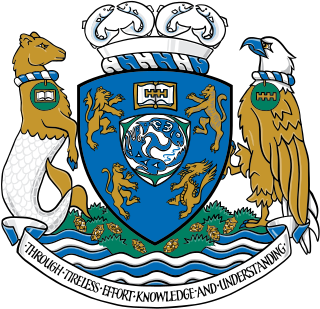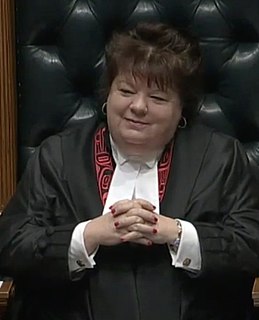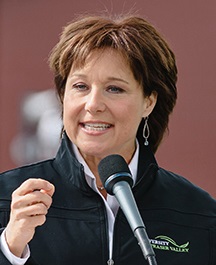
British Columbia is the westernmost province of Canada. Situated between the Pacific Ocean and the continental divide of the Rocky Mountains, the province has a diverse geography, replete with rugged landscapes that include rocky coastlines, sandy beaches, forests, lakes, mountains, inland deserts and grassy plains. It borders the Canadian province of Alberta to the east and the Canadian territory of Yukon to the north. With an estimated population of 5.2 million as of 2021, it is Canada's third-most populous province. The capital of British Columbia is Victoria and its largest city is Vancouver. Vancouver is the third-largest metropolitan area in Canada; the 2021 census recorded 2,642,825 people in Metro Vancouver. The majority of the population resides in the Lower Mainland, Vancouver Island, and Okanagan regions.

Gordon Muir Campbell, is a retired Canadian diplomat and politician who was the 35th mayor of Vancouver from 1986 to 1993 and the 34th premier of British Columbia from 2001 to 2011.
The British Columbia Hydro and Power Authority, operating as BC Hydro, is a Canadian electric utility in the province of British Columbia. It is the main electricity distributor, serving 1.8 million customers in most areas, with the exception of the City of New Westminster, where the city runs its own electrical department and portions of the West Kootenay, Okanagan, the Boundary Country and Similkameen regions, where FortisBC, a subsidiary of Fortis Inc. directly provides electric service to 213,000 customers and supplies municipally owned utilities in the same area. As a provincial Crown corporation, BC Hydro reports to the BC Ministry of Energy, Mines and Low Carbon Innovation, and is regulated by the British Columbia Utilities Commission (BCUC). Its mandate is to generate, purchase, distribute and sell electricity.

The Legislative Assembly of British Columbia is the deliberative assembly of the Parliament of British Columbia, in the province of British Columbia, Canada. The Legislative Assembly meets in Victoria. Members are elected from provincial ridings and are referred to as members of the Legislative Assembly (MLAs). Bills passed by the legislature are given royal assent by Elizabeth II, Queen of Canada, represented by the Lieutenant Governor of British Columbia.

Highway 15 (BC 15), known locally as the Pacific Highway, is a 20.99-kilometre-long (13.04 mi) north–south highway primarily located in the City of Surrey, British Columbia. The southern terminus is with Interstate 5 (I-5) near Blaine, Washington, as Washington State Route 543 (SR 543). SR 543 is a 1.75-kilometre-long (1.09 mi) connector between I-5 and the Canada–US border, linking with BC 15. Over 3,000 trucks per day pass through the border crossing along SR 543 and BC 15, because the Peace Arch border crossing does not allow commercial trucks.

Kwantlen Polytechnic University is a public degree-granting undergraduate polytechnic university in British Columbia, Canada, with campuses in Surrey, Richmond, Cloverdale, Whalley, and Langley. KPU is one of the largest institutions by enrolment in British Columbia with a total of 20,000 students and 1,400 faculty members across its five locations, encompassing the Metro Vancouver district. KPU provides undergraduate and vocational education including bachelor's degrees, associate degrees, diplomas, certificates, apprenticeships, and citations in more than 140 diverse programs.
Jackson Davies is a Canadian actor. He is best known for his role as RCMP Constable John Constable in the television series The Beachcombers, which he reprised in the TV movies The New Beachcombers (2002) and A Beachcombers Christmas (2004).
The British Columbia Treaty Process (BCTP) is a land claims negotiation process started in 1993 to resolve outstanding issues, including claims to un-extinguished indigenous rights, with British Columbia's First Nations.

Linda Reid is a Canadian politician. She was Minister of Advanced Education and a Speaker of the Legislative Assembly of British Columbia. She was first elected in 1991 to represent the riding of Richmond East and was re-elected in 1996, 2001, 2005, 2009, 2013. Reid served as Minister of State for Childcare from June 2005 to June 2009 and the Minister of State for Early Childhood Development from June 2001 to June 2005. She also served as the Deputy Speaker from 2009 until 2013.
Kevin Krueger is a former BC Liberal Member of the Legislative Assembly, in the province of British Columbia, Canada. He represented the riding of Kamloops-North Thompson from 1996 to 2009, and Kamloops-South Thompson from 2009 to 2013. Prior to entering provincial politics, he was a candidate for the federal Liberals in the 1993 federal election.
Crown corporations in Canada are government organizations with a mixture of commercial and public-policy objectives. They are directly and wholly owned by the Crown.

Lana Popham is Canadian politician representing the riding of Saanich South in the Legislature of British Columbia and has been the Minister of Agriculture since 2017. She was first elected in 2009 provincial general election to the 39th Parliament and then re-elected in 2013, 2017 and 2020 to the 40th, 41st and 42nd Parliaments. As a member of the British Columbia New Democratic Party, she was part of the official opposition to the governing BC Liberal Party until 2017 when the NDP formed the government and she became the Minister of Agriculture. As minister, she led the adoption of two bills, both of which amended the Agricultural Land Commission Act, and an order in council that began the phasing out of mink farming. While in opposition, she has served predominately as the critic on agricultural issues and introduced two private members bills: the British Columbia Local Food Act and the Prevention of Cruelty to Animals Amendment Act. Prior to her election, Popham owned and operated the organic grape orchard, Barking Dog Vineyard, on Vancouver Island.
The lack of treaties between the First Nations of British Columbia (BC) and the Canadian Crown, is a long-standing problem that has become a major issue in recent years. In 1763, the British Crown declared that only it could acquire land from First Nations through treaties. Historically only two treaties were signed with the First Nations of British Columbia. The first of which was the Douglas Treaties, negotiated by Sir James Douglas with the native people of southern Vancouver Island from 1850-1854. The second treaty, Treaty 8, signed in 1899 was part of the Numbered Treaties that were signed with First Nations across the Prairie regions. British Columbian Treaty 8 signatories are located in the Peace River Country or the far North East of BC. For over nine decades no more treaties were signed with First Nations of BC; many Native people wished to negotiate treaties, but successive BC provincial governments refused until the 1990s. A major development was the 1997 decision of the Supreme Court of Canada in the Delgamuukw v. British Columbia case that Aboriginal title still exists in British Columbia and that when dealing with Crown land, the government must consult with and may have to compensate First Nations whose rights are affected.
Kelly Lake is a community in the Peace River Country of northeastern British Columbia, Canada. It is west of the border with the province of Alberta.

The 2017 British Columbia general election was held on May 9, 2017, to elect 87 members (MLAs) to the Legislative Assembly to serve in the 41st Parliament of the Canadian province of British Columbia. In the 40th Parliament prior to this general election, the British Columbia Liberal Party formed the government under the leadership of Christy Clark, while the BC New Democratic Party, under the leadership of Adrian Dix and then John Horgan, formed the Official Opposition; the BC Green Party were also represented in the legislature with sole MLA and later leader Andrew Weaver.

The Burnaby Green Party is a municipal political party in Burnaby, British Columbia. It was founded as the Burnaby Municipal Green Party in 2011 by Rick McGowan.

Michael Lee is a Canadian politician who has represented the electoral district of Vancouver-Langara in the Legislative Assembly of British Columbia since 2017. A member of the British Columbia Liberal Party caucus, he serves as its Critic for Indigenous Relations and Reconciliation. He ran for the party's leadership in 2018 and 2022.

The 2020 British Columbia general election was held on October 24, 2020, to elect members of the Legislative Assembly to serve in the 42nd parliament of the Canadian province of British Columbia. The incumbent New Democratic Party of British Columbia won a majority government, making John Horgan the first leader in the history of the BC NDP to win a second consecutive term as Premier. The incoming Legislature marks the first time the NDP commanded an outright majority government in BC since the 1996 election, as well as the first province-wide popular vote win for the party since 1991.

A referendum on electoral reform took place by mail-in ballot between October 22 and December 7, 2018, in the Canadian province of British Columbia. 61.3 percent of voters supported maintaining the first-past-the-post voting system rather than switching to a proportional representation voting system, which was supported by 38.7 percent of voters. This was British Columbia's third referendum on electoral reform, following ones in 2005 and 2009.











